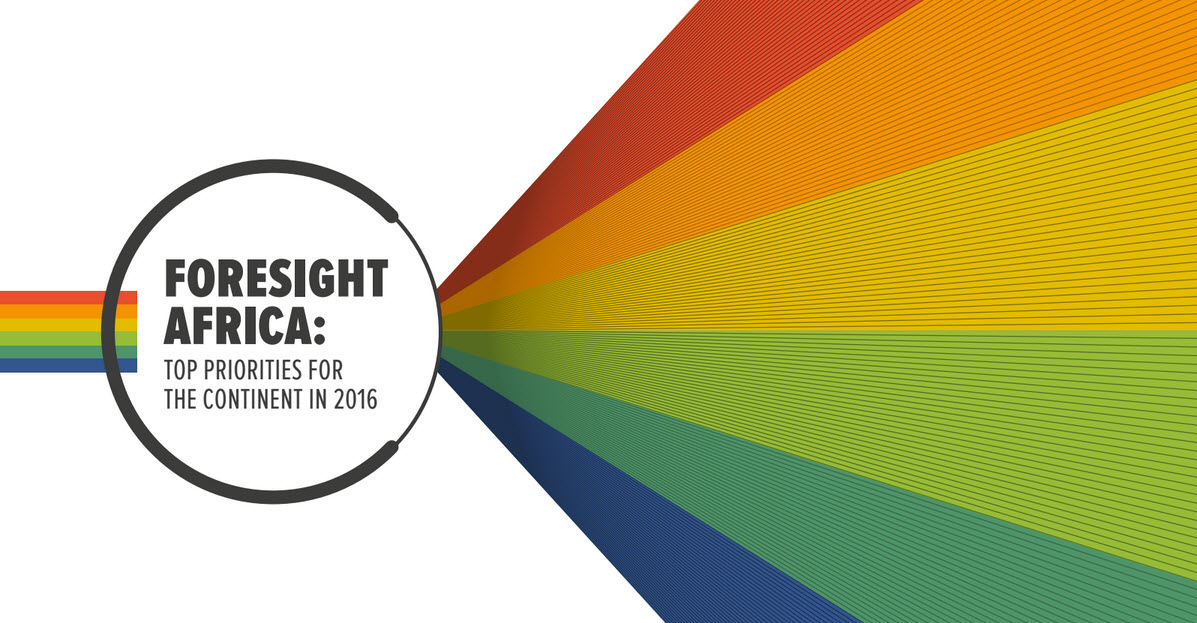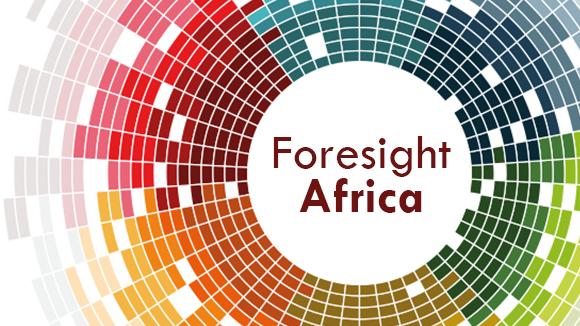Africa is at a tipping point in 2016. Despite all the success the continent has achieved in recent years, new and old dangers – economic, political, and security-related – threaten to derail its progress. With sound policymaking, effective leadership, and enough foresight, however – can meet and defeat these challenges as well as the many more to come.
In this year’s Foresight Africa, the Africa Growth Initiative and its colleagues discuss six overarching themes that place Africa at this tipping point and give their view on what they percieve to be key areas for intervention to keep Africa on its current rising trajectory. This year’s format is different from years past, encompassing viewpoints from high-level policymakers, academics, and practitioners, as well as utilizing visuals to better illustrate the paths behind and now in front of Africa.
In this chapter, Amadou Sy explores the recent external economic shocks to African economies—including the economic slowdown in China, declines in commodity prices, and the likely continued U.S. Federal Reserve interest rate hikes—that have affected and will continue to affect growth trajectories in the region. With growth slowing across the continent in 2016, policymakers must take this opportunity to discuss and enact economic policy reform for both the short and long terms.
Growth in Asia and elsewhere has shown that industrialization is crucial to job creation, a value that is enshrined in the new Sustainable Development Goals. In this chapter, John Page provides recommendations on how African governments and their international partners can revitalize the region’s stagnating industrial development and spur structural transformation.
The region has witnessed remarkable improvements in poverty reduction in recent years, but persistent challenges in inequality, education, health, and violence, among others, still plague it. As the first year of the Sustainable Development Goals, 2016 provides the opportunity to be a jumping-off point for strong policies and efforts to accomplish these goals. In this chapter, Kathleen G. Beegle and Luc Christiaensen cover the assortment of opportunities 2016 provides for supporting human development efforts and argues for the central role that better data plays in addressing them.
With Habitat III in 2016, Jérôme Chenal takes the opportunity in this chapter to explore the consequences of Africa’s rapid urbanization. Africa is the second-fastest urbanizing region in the world, which historically has facilitated other regions’ transition from a reliance on agriculture to industry and jobs. However, without strong policies to deliver services, finance and build infrastructure, and support the urban poor, Africa’s rapidly growing megacities and intermediate cities cannot deliver on their potential.
2016 sees a number of governance milestones and obstacles, including elections across the continent (particularly in Uganda, in the Democratic Republic of the Congo, and for the African Union chairperson), as well as increasing regional integration and a seemingly stalled march towards good governance. In this chapter, Richard Joseph reflects on the region’s growth-governance puzzle and the complex institutional changes necessary to move from economic growth to economic transformation.
In this chapter, Joshua P. Meltzer explores the impacts on Africa of the changing global trade environment. In particular, the Trans-Pacific Partnership Agreement will transform global trade architecture, likely to the disadvantage of Africa. However, our viewpoint contributors believe that, if African countries can successfully leverage regional integration and better utilize the African Growth and Opportunity Act, they might be able to maintain global competitiveness.
|
About Foresight Africa The Foresight Africa project is a series of reports, commentaries and events that aim to help policymakers and Africa watchers stay ahead of the trends and developments impacting the continent. Since 2011, the Brookings Africa Growth Initiative has used the occasion of the new year to assess Africa’s top priorities for the year. Join the Twitter conversation at #ForesightAfrica, and register for our event on January 20. |
The Brookings Institution is committed to quality, independence, and impact.
We are supported by a diverse array of funders. In line with our values and policies, each Brookings publication represents the sole views of its author(s).










